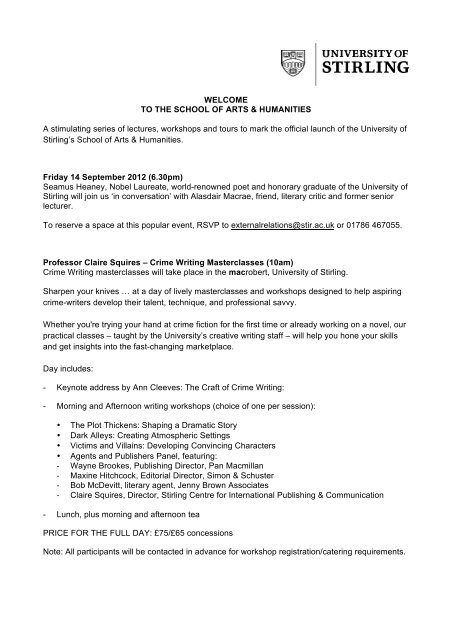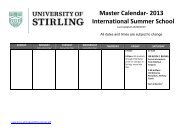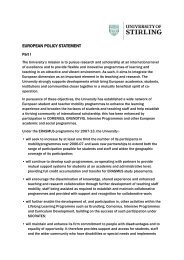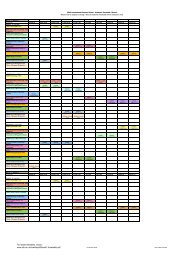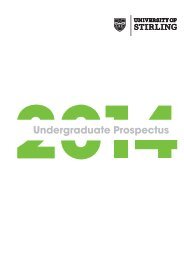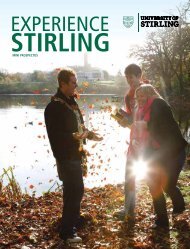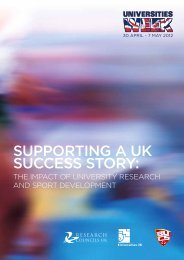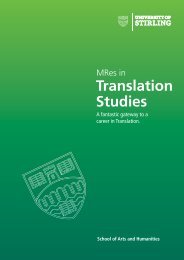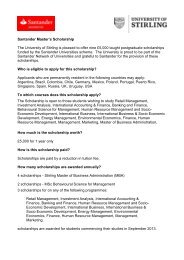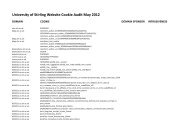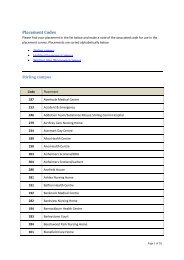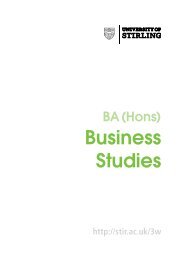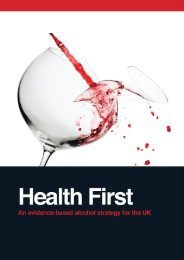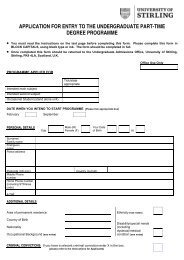Programme of Events - University of Stirling
Programme of Events - University of Stirling
Programme of Events - University of Stirling
Create successful ePaper yourself
Turn your PDF publications into a flip-book with our unique Google optimized e-Paper software.
WELCOME<br />
TO THE SCHOOL OF ARTS & HUMANITIES<br />
A stimulating series <strong>of</strong> lectures, workshops and tours to mark the <strong>of</strong>ficial launch <strong>of</strong> the <strong>University</strong> <strong>of</strong><br />
<strong>Stirling</strong>’s School <strong>of</strong> Arts & Humanities.<br />
Friday 14 September 2012 (6.30pm)<br />
Seamus Heaney, Nobel Laureate, world-renowned poet and honorary graduate <strong>of</strong> the <strong>University</strong> <strong>of</strong><br />
<strong>Stirling</strong> will join us ‘in conversation’ with Alasdair Macrae, friend, literary critic and former senior<br />
lecturer.<br />
To reserve a space at this popular event, RSVP to externalrelations@stir.ac.uk or 01786 467055.<br />
Pr<strong>of</strong>essor Claire Squires – Crime Writing Masterclasses (10am)<br />
Crime Writing masterclasses will take place in the macrobert, <strong>University</strong> <strong>of</strong> <strong>Stirling</strong>.<br />
Sharpen your knives … at a day <strong>of</strong> lively masterclasses and workshops designed to help aspiring<br />
crime-writers develop their talent, technique, and pr<strong>of</strong>essional savvy.<br />
Whether you're trying your hand at crime fiction for the first time or already working on a novel, our<br />
practical classes – taught by the <strong>University</strong>’s creative writing staff – will help you hone your skills<br />
and get insights into the fast-changing marketplace.<br />
Day includes:<br />
- Keynote address by Ann Cleeves: The Craft <strong>of</strong> Crime Writing:<br />
- Morning and Afternoon writing workshops (choice <strong>of</strong> one per session):<br />
• The Plot Thickens: Shaping a Dramatic Story<br />
• Dark Alleys: Creating Atmospheric Settings<br />
• Victims and Villains: Developing Convincing Characters<br />
• Agents and Publishers Panel, featuring:<br />
-‐ Wayne Brookes, Publishing Director, Pan Macmillan<br />
-‐ Maxine Hitchcock, Editorial Director, Simon & Schuster<br />
-‐ Bob McDevitt, literary agent, Jenny Brown Associates<br />
-‐ Claire Squires, Director, <strong>Stirling</strong> Centre for International Publishing & Communication<br />
- Lunch, plus morning and afternoon tea<br />
PRICE FOR THE FULL DAY: £75/£65 concessions<br />
Note: All participants will be contacted in advance for workshop registration/catering requirements.
Saturday 15 September 2012<br />
Members <strong>of</strong> the public, staff and students are invited to join us for an open day <strong>of</strong> lectures,<br />
workshops and tours. All events will be held in the Pathfoot building, <strong>University</strong> <strong>of</strong> <strong>Stirling</strong>.<br />
Dr Katherine Halsey - Sight and Insight in Jane Austen’s Novels (10-11am, Room C1)<br />
Different ways <strong>of</strong> seeing – looking, glancing, gazing, staring, glaring, peeping, observing, peering<br />
(and many more) – abound in Jane Austen’s novels. In her work, where the unsaid is <strong>of</strong>ten far<br />
more important than what is actually said, the language <strong>of</strong> the eye is particularly powerful. And<br />
Austen’s characters understand how to speak this language. In Persuasion, Captain Wentworth,<br />
for example, beseeches Anne with “eyes <strong>of</strong> glowing entreaty” as he pushes his letter towards her<br />
in the middle <strong>of</strong> the crowded parlour <strong>of</strong> the White Hart. When Mr Darcy meditates on the pleasure<br />
bestowed by “a pair <strong>of</strong> fine eyes” in Pride and Prejudice, he surely does so because eyes are so<br />
very expressive. And yet, however well characters may communicate with their eyes, they may<br />
also remain blind to what is most important. In this lecture, I will explore the relationship between<br />
the physical eye and the eyes <strong>of</strong> the mind in Jane Austen’s novels, concentrating particularly on<br />
Pride and Prejudice (1813) and Persuasion (1818).<br />
Isabel Mendes - Africa in Motion (11-12.30pm, LTA96)<br />
The Africa in Motion (AiM) Film Festival was created in 2005 with the aim to introduce Scottish<br />
audiences to the brilliance <strong>of</strong> African cinema and to overcome the under-representation and<br />
marginalisation <strong>of</strong> African film in British film-going culture. Our priority is to create opportunities for<br />
Scottish audiences to see African films while providing a platform for African filmmakers to exhibit<br />
their work in Scotland, but our main reason for screening the films is because we believe they are<br />
great films which should be seen the world over. Over the past six years we have screened over<br />
200 African films to audiences totalling around 15,000 people. Throughout the festival's life, the<br />
<strong>University</strong> <strong>of</strong> <strong>Stirling</strong> has been a longstanding partner and supporter. <br />
We are looking forward for the chance to introduce AiM to Stitling's academic community, share<br />
some <strong>of</strong> the African shorts which has been awarded in our Short Film Competition strand, and talk<br />
about the programme <strong>of</strong> films AiM is bringing to <strong>Stirling</strong> in November. <br />
Dr Rowan Cruft - What are ‘rights’ and why do we need them? (11am-12 noon, Room C2)<br />
In this fascinating lecture Dr Cruft, recently called as a witness at the Leveson Inquiry, will examine<br />
the nature and justification <strong>of</strong> rights and duties and take a closer look at the way in which different<br />
types <strong>of</strong> rights e.g. human rights, property rights and contractual rights are viewed within our<br />
society. Such rights are <strong>of</strong>ten criticised as an indicator <strong>of</strong> many modern ills however the questions<br />
posed in this lecture will ask you to consider what life might be like without the existence <strong>of</strong> the<br />
concept <strong>of</strong> rights.
Dr Suzanne Gilbert - James Hogg, the Ettrick Shepherd (12 noon-1pm, Room D1)<br />
As a self-educated shepherd from Ettrick Valley, James Hogg (1770-1832) was an improbable<br />
candidate for a literary career. From an impoverished family, as a child Hogg had to go into service<br />
as a cowherd having completed only a few months <strong>of</strong> formal education. From these very humble<br />
beginnings, Hogg went on to write prolifically, producing poems, songs, essays, tales, and novels,<br />
including his acknowledged masterpiece The Private Memoirs and Confessions <strong>of</strong> a Justified<br />
Sinner. His most famous book is renowned for the innovative, sophisticated way in which it<br />
presents double and multiple narratives; it may be seen as a major influence for many subsequent<br />
writers, among them Robert Louis Stevenson, Muriel Spark, Ian Rankin, and James Robertson.<br />
The <strong>Stirling</strong>/South Carolina Research Edition <strong>of</strong> the Collected Works <strong>of</strong> James Hogg is engaged in<br />
republishing all <strong>of</strong> Hogg’s works, many <strong>of</strong> which have not appeared since the early 1800s. Twentyseven<br />
<strong>of</strong> the eventual thirty-nine volumes have been published to date. Hogg is remarkable for the<br />
way in which he overcame great odds: aspiring to become a writer, he educated himself to an<br />
amazing degree by sheer force <strong>of</strong> intelligence, will, and audacity, crossing class and cultural<br />
boundaries to produce some <strong>of</strong> Scotland’s most unforgettable literature.<br />
Dr Dale Townshend - The Gothic Imagination, 1764-Present (12 noon-1pm, Room D2)<br />
This paper will provide an introduction to the dark but exciting world <strong>of</strong> the Gothic, starting with the<br />
political discourses, architectural styles and literary experiments <strong>of</strong> the eighteenth century,<br />
progressing through the monstrous curiosities <strong>of</strong> the Victorian period, and culminating in an<br />
account <strong>of</strong> the ubiquity <strong>of</strong> Gothic in contemporary culture.<br />
'Royal Observatory Edinburgh' - ‘Wish you were here? Searching for Exoplanets.’ (1-2pm,<br />
LTA96)<br />
Scotland-based scientists are helping to further the world’s knowledge about planets orbiting other<br />
stars. A sci-art collaboration between The Royal Observatory Edinburgh (key partner for the<br />
School <strong>of</strong> Arts and Humanities' programmes in Translation Studies and Translation with TESOL),<br />
Edinburgh College <strong>of</strong> Art and <strong>University</strong> <strong>of</strong> St Andrews, has produced two short documentary films<br />
looking at some <strong>of</strong> this research and technology. Following the screenings there will be a Q & A<br />
session with some <strong>of</strong> the scientists and film-makers.
Dr James Smyth - Lest Scotland Forgets: recording the nation’s Great War Memorials (2-<br />
3pm, Room C1)<br />
http://www.historyandpolitics.stir.ac.uk/research/flagshipprojects.php<br />
Dr. James J. Smyth. Dr Michael A. Penman, & Ms Sarah Bromage<br />
Lest Scotland Forgets is a pilot project, jointly funded by the <strong>University</strong> <strong>of</strong> <strong>Stirling</strong> and the Royal<br />
Society <strong>of</strong> Edinburgh, which is currently working with a group <strong>of</strong> school teachers and their students.<br />
This project has two related aims:<br />
Firstly to examine the erection <strong>of</strong> a series <strong>of</strong> local memorials: the individuals and civic societies<br />
behind construction, location, type <strong>of</strong> memorial, architectural style, and the manner in which the<br />
names <strong>of</strong> the ‘fallen’ were presented.<br />
Secondly, by using a variety <strong>of</strong> archival sources (local and national) alongside online, electronic<br />
datasets to utilise record linkage in order to provide life stories <strong>of</strong> a selection <strong>of</strong> the ‘fallen’.<br />
Our talk will examine the process <strong>of</strong> memorialisation in Scotland and show how we can create<br />
individual biographies <strong>of</strong> the ‘fallen’ through census, civil registers, newspapers, military records.<br />
In so doing we illustrate the human costs and consequences <strong>of</strong> the conflict while providing<br />
students with a valuable experience in how to conduct historical research.<br />
The ultimate ambition <strong>of</strong> Lest Scotland Forgets is to extend the project to cover all <strong>of</strong> Scotland and<br />
to produce a freely accessible database <strong>of</strong> Great War Memorials and those listed on them. In late<br />
summer an Exhibition (‘The <strong>Stirling</strong> Hundred’) on the parish memorials <strong>of</strong> <strong>Stirling</strong> and a selection <strong>of</strong><br />
those listed on them will be displayed in the Pathfoot Dining Room<br />
Sarah Bromage - The Scottish Political Archive (3-4pm, Room C1)<br />
This talk will discuss and showcase some <strong>of</strong> the collections <strong>of</strong> the Scottish Political Archive<br />
(SPA). Alongside politicians personal papers the archive contains photographic, oral and<br />
ephemeral material relating to the political history <strong>of</strong> Scotland in the twentieth and twenty first<br />
centuries. The presentation will focus on the archive’s collections relating to the devolution<br />
referendums <strong>of</strong> 1979 and 1997 and will be illustrated by images from SPA’s photographic<br />
collections. There will also be the opportunity to view pamphlets and other campaign material from<br />
the collections.<br />
Tim Thornicr<strong>of</strong>t – Presentation <strong>of</strong> Student Work (2-3pm, Pathfoot Lecture Theatre)<br />
Tim Thornicr<strong>of</strong>t – Workshops in Radio Drama and Digital Filmmaking<br />
These workshops are aimed at beginners and designed to explore—at a very simple level—some<br />
important aspects <strong>of</strong> radio drama and narrative film production.<br />
There should be a minimum <strong>of</strong> two people, and a maximum <strong>of</strong> five per workshop.<br />
A Beginner’s Guide to Recording Radio Drama (Room D4)
This workshop <strong>of</strong>fers the chance <strong>of</strong> recording a short scripted scene in the radio studio. Sound<br />
effects from CD and music will then be added to the recorded dialogue, although there will also be<br />
an opportunity to create some <strong>of</strong> these effects during production. As well as acting in the scene,<br />
those taking part will be able to watch the techniques <strong>of</strong> mixing and editing recorded material, plus<br />
they’ll see and hear how soundscapes are produced.<br />
Filmmaking—the Magic <strong>of</strong> Continuity (Room D14)<br />
When shooting films, continuity <strong>of</strong> action is vital to establish a believable sense <strong>of</strong> space and time<br />
for the audience. Though editing techniques have changed over the years, the fundamental<br />
principles <strong>of</strong> continuity remain much as they were when originally established early in the 20th<br />
century. In this workshop, we will use a simple scenario to shoot and edit a brief sequence <strong>of</strong> shots<br />
to explore the line <strong>of</strong> action, continuity <strong>of</strong> screen direction, eyelines and matching on action.<br />
The workshops will be repeated on the hour from 10.00-3.00 as follows:<br />
A Beginner’s Guide to Recording Radio Drama: 10.00, 12.00<br />
Filmmaking - The Magic <strong>of</strong> Continuity: 11.00, 1.00, 3.00<br />
During one <strong>of</strong> the radio workshop slots Tim Thornicr<strong>of</strong>t will present a one-hour programme <strong>of</strong> the<br />
best <strong>of</strong> student work from recent years.<br />
Tours <strong>of</strong> the Art Collection (11am and 1pm, Pathfoot reception)<br />
The Art Collection at the <strong>University</strong> is a varied one comprising <strong>of</strong> over 300 works including<br />
paintings, sketches, tapestries, sculpture and silver.<br />
The tradition <strong>of</strong> collecting art goes back to the founding <strong>of</strong> the <strong>University</strong> in 1967 when Pr<strong>of</strong>essor<br />
Tom Cottrell was the first Principal. A scientist by training, he came from an artistic background<br />
and had very clear ideas about art and its place in society. He felt that art should be part <strong>of</strong> the<br />
everyday experience at the <strong>University</strong> and it is philosophy that has been driving and inspiring us to<br />
keep on collecting and showing exciting art to the public ever since.<br />
Staff will meet interested parties at the reception <strong>of</strong> the Pathfoot building just before the hour and<br />
will guide you through our collections on display, including the famous Fergusson paintings - and<br />
give a brief description <strong>of</strong> the history <strong>of</strong> the Art Collection at <strong>Stirling</strong>.


